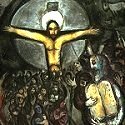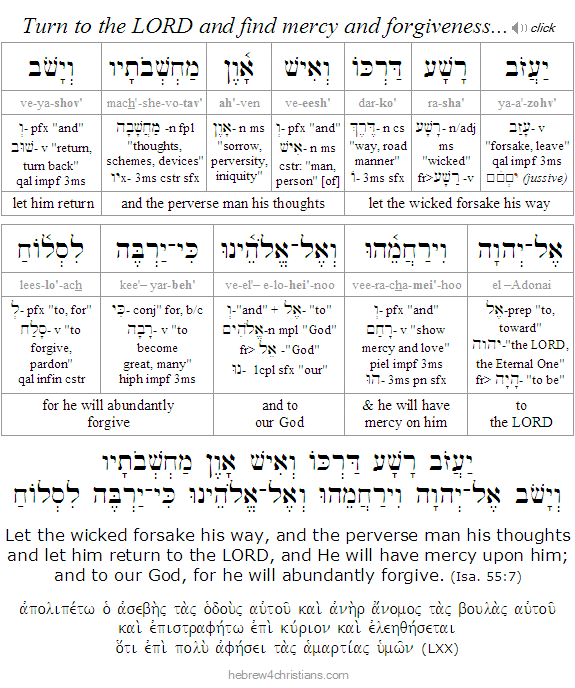|
THE MESSAGE OF THE CROSS scandalizes human pride because it unconditionally declares there is nothing we can do to justify ourselves before God apart from the work of the Messiah rendered on our behalf. Human pride naturally wants to add something to the mix - by esteeming our will or our obedience to be determinative, but the Scriptures attest that we are declared righteous by trusting in the sacrifice of God for our souls, and not because of any merit of our own (Gal. 3:11). In other words, salvation is "of the LORD," and we are entirely hopeless apart the direct intervention of God for healing.... The Lord saves us, not because of works of righteousness (ЧћЦ·ЧўЦІЧ©Ч‚ЦµЧ™ Ч”Ц·Ч¦ЦјЦ°Ч“ЦёЧ§ЦёЧ”) we might do, but solely on account of His mercy offered to us in Messiah our Savior (Titus 3:5).
In general, human pride has no quarrel with the theology of a transcendent, all-powerful, and holy God to whom we all owe obedience, and therefore religious systems based on "karma" are invariably amenable to human pride... A "First Cause" or a Source of Moral Law may present a religious demand upon the soul, but it presents no scandal to human reason. After all, the law of religion is simply "do what is good and you will be rewarded; do what is evil and you will be punished," and karma-based religions aim to effect a favorable "disposition" in the eyes of heaven. What is scandalous, however, and what is therefore entirely paradoxical to human reason, is that the Infinite One Himself became Finite and embodied as a human being, and that the infinitely transcendent One is also the entirely immanent One, pervading every possible world and every realm of creation -- including the "fallen" realm of humanity -- to become manifest in visage of Yeshua of Nazareth....
Again, it is relatively easy for human reason to concede awareness of a transcendental power that created the universe and who is the Source of Moral reality, but it cannot fathom how such Supreme Power could be made manifest in a state of weakness, identifying with what is most broken, most perverse, and most sick in the human soul and condition. The cross of Messiah is a scandal because human pride wants to deny the reality that humanity is incurably wounded, sick and without hope apart from divine intervention. Religious pride imagines that mankind is able to ascend the heights of heaven in its own strength, but the message of the cross is that God's love is so great that He is willing to descend - to willingly empty Himself to undergo shame, disgrace, condemnation - and indeed the horror of execution by crucifixion - all for the sake of our everlasting healing and salvation.
Do you want Torah that cuts to the bone? Do you want the raw, unvarnished truth? Then look to the cross of Messiah, the hallowed place (Ч”Ц·ЧћЦјЦёЧ§Ч•Ц№Чќ) where the transcendent, the all-powerful, and the holy are surrendered to become an object of horror, grief, and despair; where God's own glorious holiness and righteousness are exchanged for our sin... We must turn away from the urge to deny reality, by pretending that the salvation could be gained by some sort of self-improvement project, or by assuming that there exists some form of repentance that can take the place of the awful divine remedy given in our place. Turn to the cross and receive the death benefits of Messiah! "For I decided to know nothing among you except Yeshua the Messiah and him crucified" (1 Cor. 2:2).
Some people are reluctant to accept the truth of God's unconditional love because they fearfully imagine that doing so will lead to "lawlessness," or to a lax attitude that tolerates or even justifies sin. "Why not do evil that good may come?" they reason (Rom. 3:8). Such thinking grievously misunderstands the purpose of Torah, however, and fails to see that the "deeper Torah" allows us to walk in the light of God's truth. The goal (or "end") of the Torah is love - the divine love revealed in Messiah - and if we really love God, we will not seek an excuse to gratify our lower nature at the expense of our relationship with Him.
The scandal of the cross goes both ways, however... If human pride is offended at the truth about its hopeless condition, then God is offended when people deny or minimize the need for the cross of the Savior. When Peter sought to find an alternative cure for the fatal disease we all share, Yeshua said to him: "Out of my sight, Satan! You are a stumbling block (i.e., scandal: ПѓОєбЅ±ОЅОґО±О»бЅ№ОЅ) to me; for you do not have in mind the things of God, but the things of men" (Matt. 16:21-24). Do you want to know what outrages the Spirit of God? The denial of the cross and its eternal significance; the delusion that we can effect our own righteousness apart from God's grace. The "scandal of the cross" ultimately is a problem for human pride, and certainly not to the LORD God our Savior, who uses the cross to demonstrate the wisdom and power of God (1 Cor. 1:18). Those who deny the need for the cross, however, are left without remedy for their eternal condition (Heb. 10:26-31).
A scandal is a disgrace, a shame, an offence, even an outrage. The cross is scandalous because it represents the "death of God," that is, the sacrifice of God's transcendence, power, and holiness to become entirely identified with the fallenness of mankind. This is the shock the disciples had to face when they witnessed Yeshua die... The cross reveals that we are powerless to heal ourselves, and that the remedy is only found in the life given in our exchange. The exchange works both ways: We must deny ourselves - our pretenses, our supposed dignity, our inflated sense of self-importance - to receive what Yeshua has done by becoming our substitute. We must impute our sin to Him as our Sin-Bearer and impute His love to us as our Healer. We are crucified with Him, we are made part of that great exchange, by trusting in His work of salvation performed for us. We must be careful not to mock God. We don't give lip-service to what Yeshua has done and then revert to a pretense of righteousness based on self-determination or religious activities...
We renounce our efforts to please God and surrender ourselves to His love and care. We trust in the work of Yeshua for our righteousness, not our own meritorious works. Salvation is "of the LORD" (ЧњЦ·Ч™Ч”Ч•ЦёЧ” Ч”Ц·Ч™Ц°Ч©ЧЃЧ•ЦјЧўЦёЧ”). Again, we are not saved "by works of righteousness (ЧћЦ·ЧўЦІЧ©Ч‚ЦµЧ™ Ч”Ц·Ч¦ЦјЦ°Ч“ЦёЧ§ЦёЧ”) that we have done, but solely on account of God's mercy given to us in Messiah our Savior (Titus 3:5). Grace excludes all boasting (Eph. 2:9). We believe that God justifies the ungodly by trusting in his heart of compassion (Rom. 4:1-8). God loves us with "an everlasting love" (i.e., ahavat olam: ЧђЦ·Ч”ЦІЧ‘Ц·ЧЄ ЧўЧ•Ц№ЧњЦёЧќ) and draws us in chesed (Ч—Ц¶ЧЎЦ¶Ч“, i.e., His faithful love and kindness). As it is written: ЧђЦ·Ч”ЦІЧ‘Ц·ЧЄ ЧўЧ•Ц№ЧњЦёЧќ ЧђЦІЧ”Ц·Ч‘Ц°ЧЄЦјЦґЧ™ЧљЦ° ЧўЦ·ЧњЦѕЧ›ЦјЦµЧџ ЧћЦ°Ч©ЧЃЦ·Ч›Ц°ЧЄЦјЦґЧ™ЧљЦ° Ч—ЦёЧЎЦ¶Ч“ / "I love you with an everlasting love; therefore in chesed I draw you to me" (Jer. 31:3). Note that the word translated "I draw you" comes from the Hebrew word mashakh (ЧћЦёЧ©ЧЃЦ·ЧљЦ°), meaning to "seize" or "drag away" (the ancient Greek translation used the verb helko (бј•О»ОєП‰) to express the same idea). As Yeshua said, "No one is able to come to me unless he is "dragged away" (бј‘О»ОєбЅ»Пѓбїѓ) by the Father (John 6:44). God's chesed seizes us, scandalizes us, takes us captive, and leads us to the Savior... Spiritual rebirth is a divine act, "not of blood nor of the will of the flesh nor of the will of man, but of God" (John 1:13). In everything - including human reason itself - the LORD God Almighty is preeminent.
Hebrew Lesson:
Isaiah 55:7 Hebrew reading:
|


